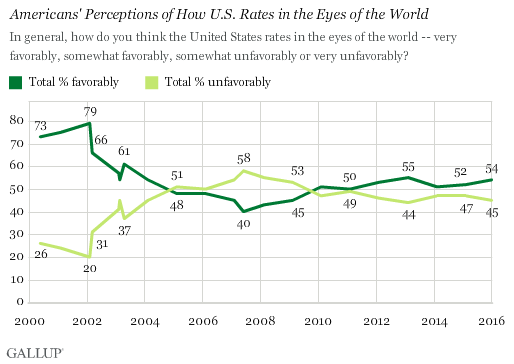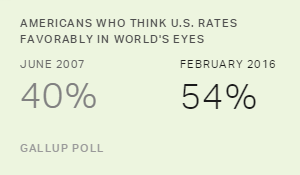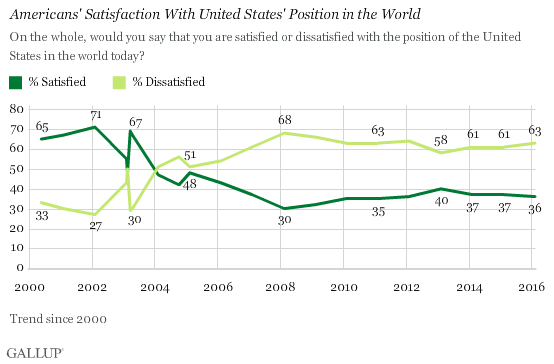Story Highlights
- 54% think the rest of the world views the U.S. favorably
- Views have been consistent since end of Iraq War in 2011
- Majority dissatisfied with the United States' global position
WASHINGTON, D.C. -- Slightly more than half of Americans, 54%, believe the rest of the world views the U.S. favorably, while 45% believe the world views the U.S. unfavorably. This is consistent with how Americans have perceived the nation's global image for the past several years. But it is a change from the last years of George W. Bush's presidency and the first year of Barack Obama's administration, when the majority thought the world viewed the U.S. unfavorably.

From 2000 until 2004, strong majorities of Americans said the world viewed the U.S. favorably. This sentiment peaked in early 2002, five months after the 9/11 attacks, when 79% said the world had a favorable view of the U.S. and 20% an unfavorable view. But Americans' perceptions of the country's image slowly worsened as the U.S. entered the Iraq War with opposition from some in the international community.
By 2005, slightly more Americans said the world viewed the U.S. unfavorably than favorably, the first time attitudes had tilted negative. Attitudes continued to sour and in June 2007, 40% said they thought the rest of the world viewed the U.S. favorably, the lowest such reading in the 16-year trend. This coincided with a sharp increase of U.S. ground troops in Iraq and followed earlier revelations of the U.S. military's poor treatment of Iraqi prisoners at Abu Ghraib and the absence of weapons of mass destruction. Furthermore, in 2007 and 2008, Americans' views that the U.S. was rated unfavorably may have stemmed from a general weariness with President Bush and the war in Iraq.

In 2010 and especially 2011, Americans were torn over whether the world viewed the U.S. favorably or unfavorably. But since the official end of the Iraq War in 2011, a clear majority of Americans have generally expressed the opinion that the world views the U.S. favorably. Part of the recent increase in perceived favorability may be related to Obama's foreign policy decisions -- which have largely favored opening relations with other nations, notably Cuba and Iran -- as well as a major new trade deal. Additionally, Obama's perceived popularity abroad improved this year and is generally up from Bush's popularity abroad during his second term.
In the latest poll, more Democrats (68%) than Republicans (39%) believe the rest of the world views the U.S. favorably -- not surprising with a Democrat in the White House.
A Majority of Americans Are Dissatisfied With U.S.'s Global Position
At the same time that Americans believe the international community views the U.S. favorably, they are largely dissatisfied with the United States' position in the world. Currently, 36% are satisfied and 63% are dissatisfied. A majority of Americans have been dissatisfied since 2004, but the percentage who are dissatisfied is down slightly from its 2008 peak of 68%.

Similar to the trend in Americans' views on how the world rates the U.S., satisfaction with the country's international standing was high in the early years of the 2000s and fell in the mid-2000s. Americans' satisfaction with the United States' position in the world spiked in the months after the Iraq War began, from 48% in February 2003 to 69% in March. It remained high at 67% in April 2003, though by February 2004, satisfaction was back down to 47%.
Democrats (52%) are currently more likely than Republicans (19%) to be satisfied with the U.S.'s position in the world. Still, only a slim majority of Democrats are satisfied, suggesting some level of concern about the U.S.'s position even among members of the president's own party.
Bottom Line
Although Americans' perceptions of the United States' global image have been at least partially repaired since the height of the Iraq War, the public remains dissatisfied with the country's position in the world. The latter likely reflects public uncertainty stemming from a mounting number of complex international issues: terrorism, the Syrian refugee crisis, North Korea's rocket launches, and Russian and Chinese expansionism. Americans themselves have become less likely than they were a few years ago to say the U.S. is the No. 1 military power in the world. Furthermore, approval of U.S. leadership is down in both Africa and Asia, and U.S. leadership on average has never received majority approval from those polled globally.
While a majority of Americans believe the world views the U.S. favorably, Americans have been consistently dissatisfied with the U.S.'s position in the world. This aligns with the views of most Republican presidential candidates this year -- who say the U.S., especially the military, is weak, while Obama strongly disagrees. The two Democratic candidates often spar over their respective votes about going to war in Iraq, but do not express much disagreement with Obama's foreign policy decisions.
Historical data are available in Gallup Analytics.
Survey Methods
Results for this Gallup poll are based on telephone interviews conducted Feb. 3-7, 2016, with a random sample of 1,021 adults, aged 18 and older, living in all 50 U.S. states and the District of Columbia. For results based on the total sample of national adults, the margin of sampling error is ±4 percentage points at the 95% confidence level. All reported margins of sampling error include computed design effects for weighting.
Each sample of national adults includes a minimum quota of 60% cellphone respondents and 40% landline respondents, with additional minimum quotas by time zone within region. Landline and cellular telephone numbers are selected using random-digit-dial methods.
Learn more about how the Gallup Poll Social Series works.
